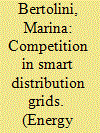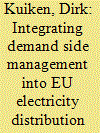|
|
|
Sort Order |
|
|
|
Items / Page
|
|
|
|
|
|
|
| Srl | Item |
| 1 |
ID:
174955


|
|
|
|
|
| Summary/Abstract |
Smart grids are often considered a cornerstone of energy transition and market liberalization in electric industries. From a critical reading of the interdisciplinary academic and governmental literature, we draw a new definition of grid smartness that is based on the reduction of the volatility of market prices and flows. Then, relying on a simple industrial-organization model of the electric market, we analyze the impact of smart grids on competition among energy suppliers and on the incentives of distribution system operators to invest in it. We show that the risk-reduction effect of smart grids pushes firms to supply more energy. However, the latter can be compensated by an indirect competition effect of investments in smart grids which prevents the entry of firms into the market, though the aggregate effect on energy supply is always positive. We also find that distribution system operators under-invest in smart grids because they fail to internalize positive externalities on energy consumers and producers.
|
|
|
|
|
|
|
|
|
|
|
|
|
|
|
|
| 2 |
ID:
183043


|
|
|
|
|
| Summary/Abstract |
The rapid integration of renewable energy sources and demand-side participation has changed how electrical energy is being purchased, transmitted, distributed, or even consumed. It has opened new opportunities for the Indian power sector to redefine its existing operational and business models to cope with the unique challenges and follow an approach that maximizes social welfare across all energy supply chain segments. This journey will have significant impacts on the Distribution companies (DISCOMs). The anticipated segregation of wire and supply business would bring more operational efficiency in the distribution sector. The subsequent entry of retailers will handle the supply business of electricity. A new entity is likely to emerge as Distribution System Operator (DSO), providing network access, grid services and enabling consumer market participation. The emergence of DSO is decisive in achieving better socioeconomic and environmental benefits. The idea of DSO is still at the conceptual level in India. In this paper, an attempt has been made to present the DSO definition, highlight its need, enlist various DSO functions, and suggest possible DSO creation options. DSO's few competitive market models are examined from the Indian perspective, which will engage all stakeholders actively and ensure the reliable and efficient operation of the overall Indian power grid.
|
|
|
|
|
|
|
|
|
|
|
|
|
|
|
|
| 3 |
ID:
166946


|
|
|
|
|
| Summary/Abstract |
The lack of appropriate regulatory frameworks is a main barrier for the expansion of distribution grids. Therefore, we ask whether the amendment of German incentive regulation ordinance will reduce agency costs between distribution system operators and the regulatory authority. To answer this question, we elaborate a theoretical framework based on regarding literature in the fields of (1) principal agency theory and (2) German grid regulation. We then apply this framework to changes in German incentive regulation for distribution grid operators: first, we statistically proof the existence of incentives to shift investments in time under the old German grid regulation; second, we derive that these misleading incentives are erased by its amendment; third, we quantitatively assess the expected effects on distribution grid operators’ investment behavior; and fourth, we conclude that the amendment leads to a diminished dead weight loss. Our results offer a quantitative basis for ongoing political discussions on appropriate regulation schemes. Based on our results, we can draw the conclusions that (1) the amendment of German grid regulation is an appropriate measure to reduce misleading incentives for distribution grid operators and (2) still a dead weight loss exists and other regulation schemes such as Yardstick competition should be considered.
|
|
|
|
|
|
|
|
|
|
|
|
|
|
|
|
| 4 |
ID:
166563


|
|
|
|
|
| Summary/Abstract |
The EU goals for renewable electricity cause significant changes of electrical loads in distribution systems, in which most renewable electricity sources are integrated. This poses a challenge for distribution system operators (DSOs) as their networks are not designed for such load changes. DSOs could use networks more efficiently with demand side management (DSM), where consumers of electricity alter their consumption patterns, shifting (production/consumption) loads in the distribution system. In such a setting, consumers would trade DSM services with the DSOs. However, currently, DSOs follow the ‘copper plate approach’, which assumes the system should have sufficient capacity to ensure that the desired volumes of electricity can be transported. This seeks to guarantee regulated third party access (rTPA) for all system users. Next to rTPA, based on regulated tasks, DSOs should ensure secure, reliable and efficient systems. In doing so, the DSOs are bound by unbundling requirements, which do not allow them to be involved in any activities other than those related to distribution. Therefore, especially production and supply are not allowed. Still, it seems debatable whether EU law allows DSOs to apply DSM, as it has an impact on both the access conditions to the electricity system, and the production, supply and trade of electricity. This article further analyses how DSM relates to the legal framework of DSOs, which obstacles are present, and how DSM could be traded between DSOs and system users.
|
|
|
|
|
|
|
|
|
|
|
|
|
|
|
|
| 5 |
ID:
166953


|
|
|
|
|
| Summary/Abstract |
Distributed photo-voltaic (PV) generation is one of the pillars of energy transitions around the world, but its deployment in the distribution grid requires costly reinforcements and expansions. Prosumage – consisting of a household-level PV unit coupled with a battery storage system – has been proposed as an effective means to facilitate the integration of renewable energy sources and reduce distribution grid stress. However, tapping its full potential requires regulatory interventions; otherwise, system costs could rise despite increasing flexibility. We analyze the effectiveness of different policy schemes to mitigate the need for distribution capacity expansion by incentivizing beneficial storage operation. Our novel top-down modeling approach allows analyzing effects on market prices, storage dispatch, induced distribution grid requirements, system costs, and distributional implications. Based on German power system data, numerical results indicate that distribution grid requirements can be reduced through simple feed-in policies. A uniform limit on maximum grid feed-in can leave distribution system operators better off, even if they fully compensate prosumage households for foregone revenue. Policies imposing more differentiated limits at the regional level result in only marginal efficiency improvements. Complete self-sufficiency (autarky) is socially undesirable, as it confines important balancing potential and can increase system costs despite adding storage.
|
|
|
|
|
|
|
|
|
|
|
|
|
|
|
|
|
|
|
|
|